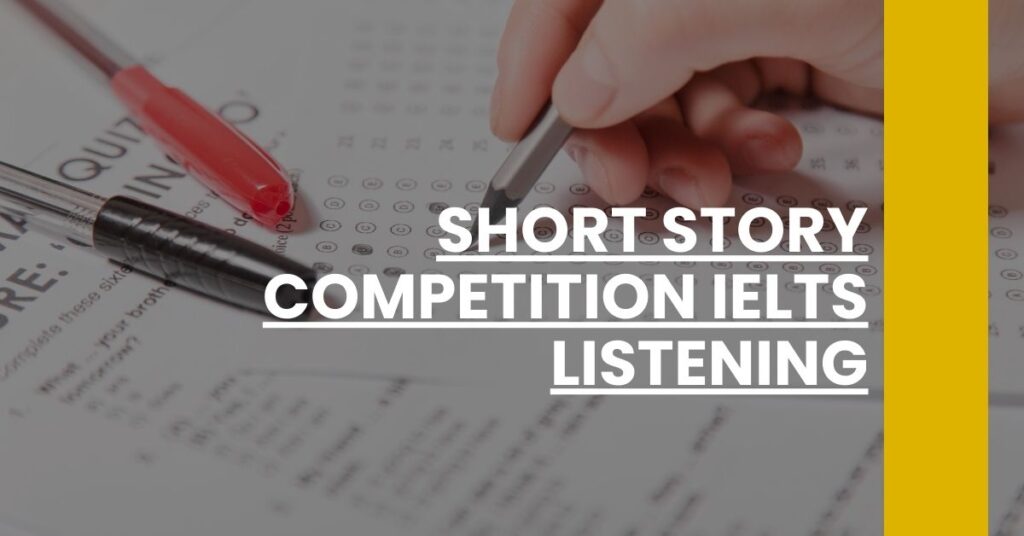Master short story competition IELTS listening with our targeted guide.
- Boost Comprehension: Enhance your listening skills through engaging short story audio.
- Varied Topics: Get exposed to a range of accents and themes common in short story competitions.
- Active Listening Practice: Develop critical listening techniques tailored for IELTS success.
Elevate your IELTS listening score with short story competition insights.
- Understanding the IELTS Listening Section
- The Role of Short Story Competitions in IELTS Listening
- Exploring Different Types of Short Story Competition Content
- Strategies for Utilizing Short Story Content to Improve Listening Skills
- Analyzing Past IELTS Listening Questions with a Short Story Lens
- Tips on Active Listening from Short Story Narrations
- Preparing for IELTS Listening: A Step-by-Step Guide with a Short Story Focus
- Overcoming Common Challenges in IELTS Listening through Short Stories
- Conclusion: Synthesizing Short Story Power for IELTS Success
Understanding the IELTS Listening Section
Are you gearing up for the IELTS Listening test and seeking a novel way to enhance your skills? A short story competition could be your secret weapon. Let’s dive into what makes the IELTS Listening section unique and how it sets the stage for an immersive learning experience.
The Breakdown of IELTS Listening
The IELTS Listening section is a critical part of the exam, designed to assess your ability to understand spoken English in various contexts. Here’s what you can expect:
- Section 1: A conversation between two individuals set in an everyday social context.
- Section 2: A monologue, often a speech about local facilities or daily life.
- Section 3: A discussion among up to four people situated in an educational or training context.
- Section 4: A monologue on an academic subject, such as a university lecture.
Each section comes with its challenges, ranging from discerning key information from a casual conversation to following a complex argument in a lecture. To conquer these, embracing active listening is crucial – this means not just hearing the words, but understanding, interpreting, and evaluating them in real-time.
Why Short Story Competitions?
Short story competitions offer a unique avenue for IELTS listening practice. They provide diverse narratives, accents, and settings, mirroring the variety of dialogues and monologues you’ll encounter in the IELTS test. With each new story, you’re introduced to different language uses and vocabulary, aiding you in acclimating to the unpredictable nature of the listening section.
The Role of Short Story Competitions in IELTS Listening
As you scour the web for short story competition IELTS listening resources, you’ll find a treasure trove of materials ripe for practice. Stories have a start, a tension arc, and a conclusion, offering a structured way to practice your listening and prediction skills.
How Stories Parallels IELTS
Short story competitions involve various narrative forms, such as dialogues and monologues, which can emulate the IELTS Listening test’s structure. By listening to stories, you learn to:
- Distinguish individual voices: Just like discerning speakers in the IELTS Listening test.
- Catch plot twists: Essential for predicting and understanding quick changes during listening section conversations.
- Interpret tone and mood: Providing an edge when it comes to questions that require understanding the speaker’s attitude.
The Potential Benefits for Test-Takers
By integrating short stories into your IELTS Preparation, you stand to gain:
- Enhanced comprehension skills: As stories often use rich language and complex narratives.
- Flexible thinking: Critical for the multiple choice and matching type questions in IELTS.
- Greater concentration: Narratives draw you in, so you listen more attentively – an invaluable skill for the test.
Exploring Different Types of Short Story Competition Content
Gain a competitive edge by delving into the world of short story competitions. These engaging narratives can take you to every corner of the listening spectrum.
Diversity in Short Story Content
Each story is a new journey, a fresh opportunity to experience English in its various forms. You might listen to:
- Character-driven tales: Where dialogue takes center stage, perfect for practicing conversational listening.
- Descriptive narratives: Immersing you in detail and vocabulary that can be akin to IELTS Section 4 lectures.
- Cultural stories: Offering exposure to a range of accents and speaking styles, similar to the variety you’ll hear in IELTS.
Strategies for Utilizing Short Story Content to Improve Listening Skills
Taking the innovative route of using short story competition content for IELTS listening practice could be a game-changer. Here’s how you can best leverage this tool:
Integrating Short Story Audio in Practice Regimens
- Simulate exam conditions: Use short story audio clips to mimic the conditions of the IELTS test. Listen without pauses, jot down essential points, and reflect on the narrative development as you would for test questions.
- Vocabulary and theme prediction: Before hitting play, read the title or a brief summary. Predict the vocabulary and themes that may arise, and check against what you hear.
- Narrative analysis: Pause after significant plot points to summarize what you’ve heard. This practice mimicks IELTS tasks asking for specific information.
Focused Listening Techniques
Engage with the story as if you’re part of it. Imagine the setting, visualize the characters, and react to the storyline. This helps to solidify understanding and retention—a skill that pays off when listening for details in the IELTS test.
By integrating short stories into your IELTS study plan, you’re not just preparing for an exam; you’re embarking on a journey through language that sharpens your listening prowess in a captivating and effective way. Join the ranks of countless learners who have found that the vibrant world of short story competition IELTS listening is not only a practice ground but a pathway to mastering the listening skills needed to excel.
Analyzing Past IELTS Listening Questions with a Short Story Lens
Exploring the IELTS Listening test through the prism of short story elements can offer you fresh insights that can significantly boost your test-taking confidence. Let’s dissect past IELTS Listening questions and unearth how they mirror components found in short stories.
Unpack the Narrative Structure
Each IELTS Listening recording tells a story. Like any good tale, it has an exposition, a clash (the main point or conflict), and a resolution. Recognizing this arc can guide you to anticipate and understand the flow of conversations or monologues in the test.
- Character introduction: Recognize the speakers and their intentions early on.
- Identifying the plot: Focus on the development of the topic. For instance, a conversation about organizing an event in Section 1 has a natural progression – from initial planning stages to final remarks.
Draw Parallels with Story Characters
In a short story competition, different voices and personas come to life through the narration. In IELTS Section 3, you might encounter a group discussion among students, each with unique viewpoints – echoing the diverse character dynamics in stories.
- Voice distinction: Pay attention to how each character (or speaker) presents themselves – their speech patterns can reveal their identity and role.
- Opinion tracking: Notice how each character’s views evolve throughout the story. This echoes IELTS tasks where you need to identify who said what.
Analyze the Setting and Descriptions
Aural imagery is often painted in short stories and in IELTS Section 4 lectures. The vivid descriptions not only serve the narrative but also set the stage for specific details one might need to pay attention to.
- Visually map information: As you listen to descriptions in the test, try to create a mental map – this will help you remember and locate specific information.
Tips on Active Listening from Short Story Narrations
Active listening can be developed and honed by immersing yourself in short story narrations. These narrations, with their varied themes and styles, are excellent training grounds for the kind of attentive and analytical listening you’ll need for the IELTS test.
Sharpen Your Predictive Skills
As narrators weave their tales, they drop hints about what’s to come. Active listeners can pick up on these and predict the trajectory of the story.
- Anticipate twists: Use title cues and story settings to guess what might happen next.
- Context clues: Pay attention to the background noise and ambient sounds in recordings which can offer context just like in a short story.
Develop a Keen Ear for Detail
By listening to stories, you become skilled at picking up subtle cues – a skill that proves invaluable for identifying correct answers during the exam.
- Note changes in tone: The narrator’s shift in intonation often signals a change in the narrative or the introduction of important information.
- Isolate the essentials: Focus on key phrases or terms that are often repeated or emphasized, as they likely hold importance.
Preparing for IELTS Listening: A Step-by-Step Guide with a Short Story Focus
Preparing for the IELTS Listening section becomes more manageable – and even enjoyable – when incorporating short stories into your regimen. Follow this step-by-step guide to make the most of these narrations.
- Choose a Variety of Stories: Select stories across genres and from diverse authors to get used to different accents, speeds, and intonations – as you would experience in the actual test.
- Listening Sessions: Dedicate specific times for focused listening without distractions. Treat each session as you would a full IELTS Listening test segment.
- Post-Listening Analysis: After listening to a story, write a summary of what you heard, focusing on main ideas, details, speakers’ purposes, and any conclusions drawn.
- Repeat Listening: Listen to the same story multiple times to catch nuances you may have missed initially, fostering deep listening akin to IELTS requirements.
Utilize resources like short story podcasts to find a plethora of content suited for this method.
Overcoming Common Challenges in IELTS Listening through Short Stories
Short stories can offer creative solutions to the common challenges faced in the IELTS Listening section. Engaging with these narratives equips you with the techniques to navigate potential obstacles.
Facing Fast Speech and Accents
Stories often come alive through the voice of a narrator, who may speak quickly or with an unfamiliar accent.
- Accent adaptation: Regular exposure to varying narrations will help you adapt to the range of accents you’ll encounter in IELTS.
- Speed adjustment: Learning to keep up with fast-paced stories will train your ears for quicker dialogues and lectures.
Dealing with Distractions and Overwhelm
Listening tests can be daunting with their simultaneous streams of information. A story’s plot can similarly become complex with intertwining threads.
- Focus on the storyline amidst noise: Train yourself to concentrate on the main narrative, blocking out less relevant details – a direct skill transferable to the IELTS task.
Conclusion: Synthesizing Short Story Power for IELTS Success
Embracing the world of short stories can be a potent strategy in your IELTS Listening preparation arsenal. Not only do you fortify your listening skills through varied and engaging content, but you also develop critical abilities like accent adaptation, predictive listening, and maintaining focus against distractions.
Remember, your journey with short story competition IELTS listening techniques is not just about reaching a test score – it’s about becoming a more proficient, adaptable, and confident English listener. Harness the power of storytelling and let it propel you toward your IELTS goals, making the listening section not just a challenge to overcome but a narrative to enjoy.
Master IELTS Listening with short story competition tactics; enhance your skills and strategy for exam success efficiently and engagingly.

